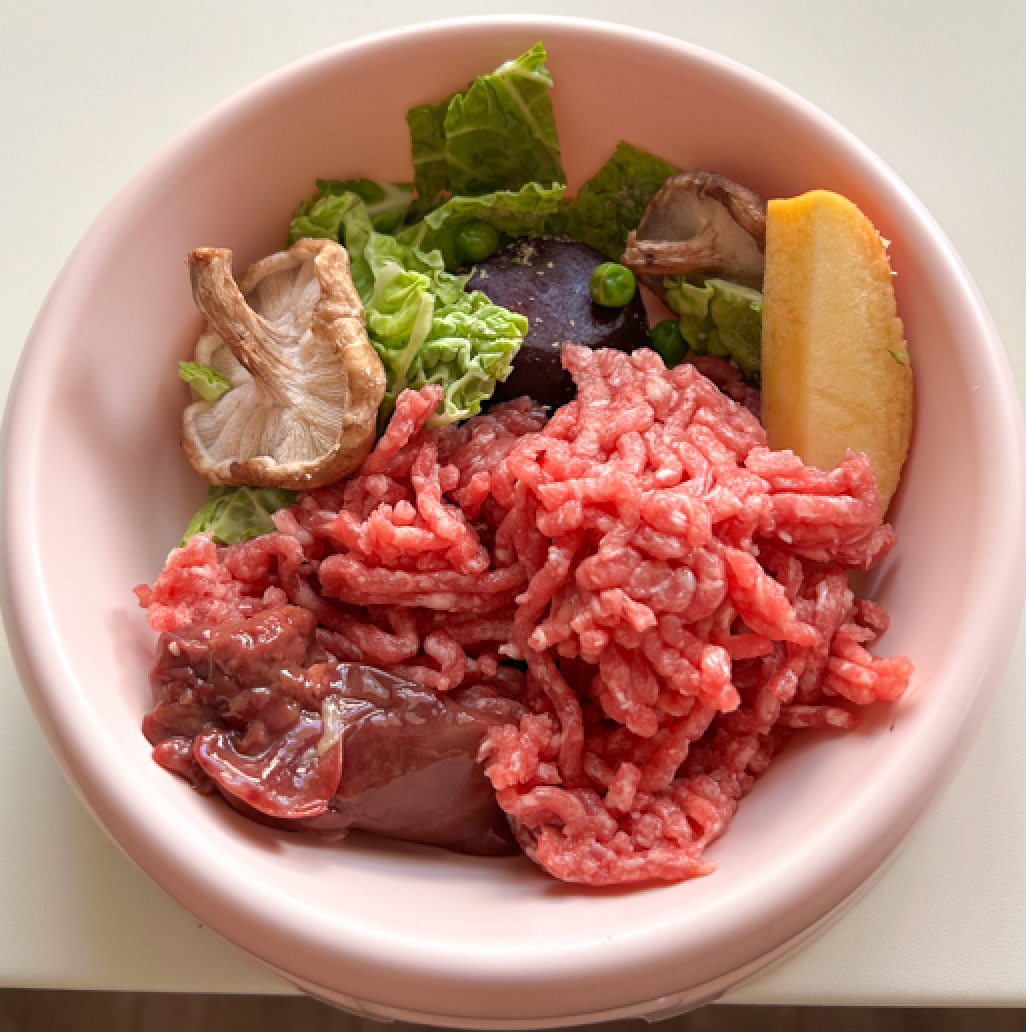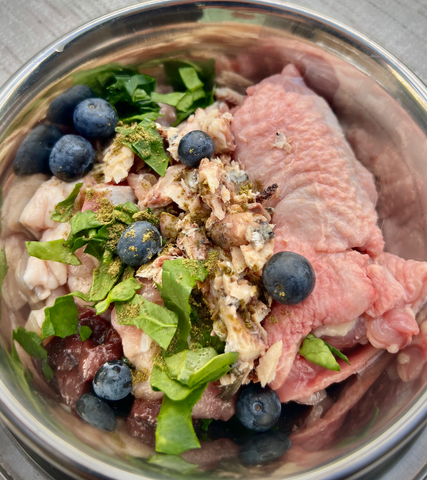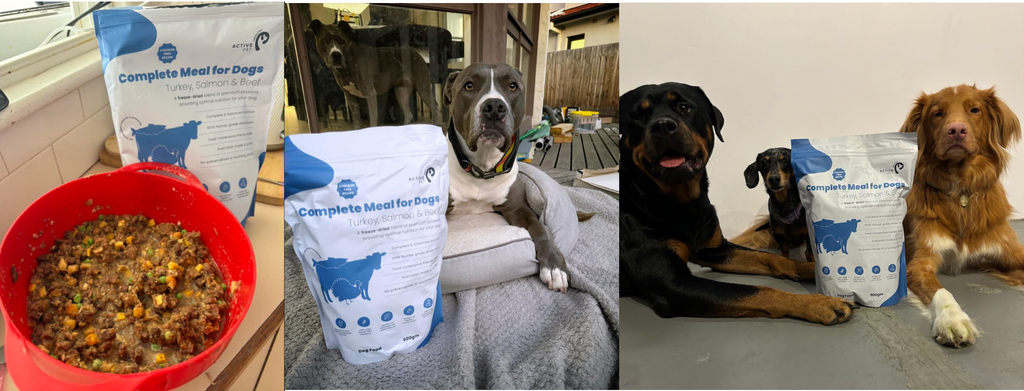
Why raw dog food is becoming popular with dog owners
As pet parents, we all want the best for our furry companions. This is one of the reasons why raw dog food is gaining popularity among dog owners in Australia.
Raw feeding is a type of diet that consists of uncooked and unprocessed foods, such as meat, bones, and vegetables.
There are several benefits of raw dog food that make it an attractive option for pet parents who want to provide their dogs with a healthy and balanced diet. In this article, we will explore the reasons behind the growing popularity of raw dog food and discuss its many benefits.

- Raw dog food is gaining popularity among Australian pet owners.
- Raw feeding consists of uncooked and unprocessed foods such as meat, bones, and vegetables.
- Raw dog food offers several benefits for a healthy and balanced diet.
Understanding raw feeding for dogs
When it comes to feeding our furry friends, there are plenty of options out there. From dry kibble to canned food, it can be overwhelming trying to choose the right one for your dog. However, in recent years, a new trend has emerged that is gaining traction among pet parents: raw feeding.
Raw feeding is the practice of feeding dogs a diet that consists of raw meat, bones, fruits, and vegetables, rather than processed commercial dog food. The concept of raw feeding is based on the idea that dogs are carnivores and their bodies are designed to digest raw food.
Compared to traditional commercial dog food, raw food is closer to what dogs would eat in the wild, and advocates claim that it provides a range of health benefits, such as improved digestion, shinier coat, and stronger immune system.
While raw feeding may seem like a radical departure from traditional dog food, it is important to note that it is not without risks. Feeding raw food requires careful handling to avoid contamination and ensure that the diet is nutritionally balanced. It is also important to consult with a veterinarian before making the switch to raw feeding, to ensure that it is appropriate for your dog's individual needs.
The difference between raw feeding and commercial dog food
The main difference between raw feeding and commercial dog food lies in the ingredients. Commercial dog food typically contains a mixture of meat, grains, vegetables, and other ingredients that are processed at high temperatures to create a uniform texture and preserve shelf life. In contrast, raw food is made up of fresh, uncooked ingredients that are served as nature intended.
Another key difference is in the processing. Raw feeding does not involve any processing, whereas commercial dog food is heavily processed to create a uniform texture and ensure it has a long shelf life. Processing removes many of the natural nutrients, which is why most commercial dog foods are supplemented with vitamins and minerals.
Overall, raw feeding offers a more natural, nutrient-dense diet for dogs, compared to the highly processed and supplemented commercial dog food. However, it also requires more careful handling and preparation to ensure it is safe and nutritionally balanced.
"Raw feeding is the practice of feeding dogs a diet that consists of raw meat, bones, fruits, and vegetables, rather than processed commercial dog food."
Nutritional value of raw dog food
Raw dog food is a nutrient-packed option that has gained popularity among Australian pet parents in recent years. Not only does it provide many health benefits, but it also helps to keep dogs happy and energetic. Here, we will explore the nutritional value of raw dog food and why it is a great choice for your furry friend.
Proteins
A key component of raw dog food is protein, which is essential for strong muscles, healthy cells, and overall body maintenance. The protein in raw dog food typically comes from high-quality sources such as beef, chicken, lamb, and fish. These meats are rich in essential amino acids, which are the building blocks of protein that cannot be produced by the body and must be obtained from food.
One of the benefits of raw dog food is that the protein in it is not denatured by cooking, which means it retains its full nutritional value. This makes it easier for dogs to digest and absorb, allowing them to get the most out of their food.
Fats
Fat is another important nutrient in raw dog food that provides energy and aids in the absorption of vitamins. The fats in raw dog food come from sources such as animal fat, fish oil, and flaxseed oil. These fats contain essential fatty acids, which are important for healthy skin, coat, and brain function in dogs.
It is worth noting that raw dog food is typically higher in fat than commercial dog food, so it is important to ensure that your dog is not overeating or becoming overweight. However, when included as part of a balanced diet, the fats in raw dog food can be highly beneficial to your pet's health.
Vitamins and minerals
Raw dog food is rich in essential vitamins and minerals that are crucial for overall wellbeing. These include vitamin B12, vitamin D, calcium, phosphorus, and zinc, among others. These nutrients are vital for maintaining healthy bones, teeth, muscles, and organs, and they help to support a strong immune system.
In particular, raw dog food is an excellent source of vitamin B12, which is necessary for nervous system function, red blood cell production, and DNA synthesis. Since dogs cannot produce vitamin B12 on their own, they rely on food sources to obtain this vital nutrient.
Improved digestion and nutrient absorption
Raw dog food can have a significant impact on a dog's digestive system. As it is free from artificial additives and preservatives, it is easier to digest and allows for better nutrient absorption. This is because the natural ingredients in raw food contain digestive enzymes that help break down food more efficiently.
Dogs fed on raw food tend to have less bloating and flatulence, as the natural ingredients are easier to digest and do not ferment in the gut. This can be especially beneficial for dogs with sensitive stomachs or digestive issues.
A study by the Journal of Animal Science has also found that dogs fed on raw food have significantly higher levels of digestibility of protein and fat compared to those fed on commercial dog food. This means that dogs can receive more of the essential nutrients they need to thrive.
The role of probiotics
Raw dog food also contains natural probiotics, which are beneficial bacteria that play a vital role in gut health. These probiotics help improve the balance of good and bad bacteria in your dog's gut, which can lead to improved digestive health and a stronger immune system.
Commercial dog food, on the other hand, typically contains fewer probiotics and may even contain harmful bacteria due to the high-heat processing used in its production.
Raw bones and digestion
Included in raw dog food are raw bones, which can help improve a dog's dental health, but they also have a positive effect on digestion. Raw bones contain natural enzymes and nutrients that help break down food and encourage healthy gut function.
It's important to note that only raw bones should be given to dogs, as cooked bones can splinter and cause serious injury to a dog's digestive tract. Always supervise your dog when giving them raw bones and choose a size appropriate for their breed and size.
"Raw dog food can provide a range of benefits for a dog's digestive system, including improved nutrient absorption and healthy gut function."
Enhanced immune system
Did you know that raw dog food can help boost your furry friend's immunity? A strong immune system is essential for your dog's overall health and well-being. Raw dog food contains specific nutrients and antioxidants that help enhance the immune response, making your pet more resilient to diseases and infections.
Australian pet owners who have switched to raw dog food have reported a significant improvement in their pet's immune system. Raw food contains high levels of Vitamin E, Vitamin C, and Zinc, which are crucial in maintaining optimal immune function.
| Nutrient | Raw dog food (per 100g) | Commercial dog food (per 100g) |
|---|---|---|
| Vitamin E | 1.49 mg | 0.13 mg |
| Vitamin C | 3.3 mg | 0 mg |
| Zinc | 1.21 mg | 0.97 mg |
The table above highlights the significant difference in the levels of Vitamin E, Vitamin C, and Zinc between raw dog food and commercial dog food. The amounts of these nutrients in commercial dog food are significantly lower than those found in raw dog food, making it difficult to achieve optimum immune function through commercial dog food alone.
As pet parents, we want to provide our dogs with the best possible care. By feeding them raw dog food, we can help boost their immune system and give them a healthier and happier life.
Promotes dental health
As dog owners, we all want our furry friends to have healthy teeth and gums. Dental health is not just crucial for good breath, but it also plays an essential role in your dog's overall well-being. Raw dog food can be an excellent solution for maintaining good dental health.
Chewing is a natural behaviour for dogs, and raw dog food allows them to exercise their jaws and work on their teeth and gums in a natural and safe way. Raw bones are an excellent source of dental exercise, as they can help remove plaque, reduce tartar buildup, and prevent periodontal disease.
| Raw dog food | Commercial dog food |
|---|---|
| Allows natural chewing | Hard kibble can break teeth |
| Reduces tartar buildup | Can lead to periodontal disease |
| Contains no artificial additives | May contain chemicals harmful to teeth |
Choosing raw dog food over commercial dog food can help keep your dog's teeth strong and healthy. It's important to note that not all raw bones are safe for dogs, so always do your research and consult with your veterinarian before introducing raw bones to your dog's diet.
At the heart of raw dog food's popularity is its ability to support a dog's internal health. However, the benefits of raw feeding extend beyond the internal, and can lead to a shinier coat and healthier skin.
One of the key factors in achieving a healthy coat is a balanced diet, and raw dog food is packed with nutrients that are essential for healthy skin and a shiny coat.
The primary nutrient that contributes to a shiny coat is protein. Raw dog food is typically higher in protein than traditional commercial dog food, and this protein is readily absorbed and utilised by a dog's body for maintaining and repairing skin, hair, and nail tissues.
Raw dog food is also rich in essential fatty acids, including omega-3 and omega-6, which are vital for maintaining skin health and promoting a healthy coat. A balanced omega-3 to omega-6 ratio in a dog's diet can help reduce inflammation and prevent skin allergies, dandruff, and other related issues.
Another advantage of raw dog food is the absence of artificial additives and preservatives that can contribute to skin sensitivities and allergies.
Overall, a switch to raw dog food can lead to a healthy, shiny coat, and reduce allergies and skin irritations, providing a happier and more comfortable pet.
Weight management and muscle development
Raw dog food offers a balanced nutrition that is ideal for maintaining a healthy weight and promoting muscle development in dogs. Unlike commercial kibble that is high in carbohydrates, raw dog food has a high protein content that helps build lean muscle mass.
Protein is essential for numerous physiological functions in dogs, including muscle growth, repair, and maintenance. By providing your dog with raw dog food, you are giving them the right balance of protein, fats, and carbohydrates to support healthy body condition and vitality.
| Nutrient | Raw Dog Food | Commercial Kibble |
|---|---|---|
| Protein | 15-25% | 18-22% |
| Fat | 10-15% | 10-16% |
| Carbohydrates | 5-10% | 45-55% |
As you can see, raw dog food has a lower percentage of carbohydrates and a higher percentage of protein and fats than commercial kibble. This means that your dog can achieve and maintain a healthy weight more easily and efficiently with raw dog food.
In addition to supporting weight management, raw dog food also promotes muscle development and maintenance. The amino acids in protein are important building blocks for muscle tissue and can help your dog stay strong and agile. Raw dog food also provides a natural source of chondroitin and glucosamine, which are essential for joint health and mobility.
Overall, raw dog food offers a balanced, natural, and nutritious diet that can support healthy weight management and muscle development in dogs. Making the switch to raw feeding can help you give your dog the best possible diet for a happy and active life.
Increased energy and vitality
Raw dog food is packed with nutrients that can provide your furry friend with a sustainable source of energy, making it ideal for active dogs. This is because raw dog food contains bioavailable nutrients that are easily digestible and absorbed by the body. As a result, dogs that eat raw dog food often have more energy and vitality than those on a commercial diet.
The high protein content in raw dog food is particularly beneficial for active dogs, as it supports muscle development. Additionally, raw dog food is free from synthetic additives and preservatives that can contribute to a dog feeling sluggish and tired. By feeding your dog a diet rich in natural nutrients, you can help them maintain their energy and enthusiasm for life.
One study found that dogs on a raw food diet had significantly higher levels of physical activity compared to those on a commercial diet. This suggests that raw dog food may be a great option for pet parents who want to keep their dogs lively and energetic.
So if you want to boost your dog's energy and vitality, consider making the switch to raw dog food. Not only will you be providing your dog with a healthier diet, but you'll also be giving them the fuel they need to live life to the fullest.
Allergies and Sensitivities
If your dog suffers from allergies or food sensitivities, switching to raw dog food could be the solution you've been searching for. Many dogs experience allergic reactions to common ingredients found in commercial dog food, such as grains and artificial preservatives.
Raw dog food, on the other hand, is free from these additives and is made from whole food ingredients. This can make it much easier for dogs with food sensitivities to digest and absorb the necessary nutrients without triggering an allergic reaction. By eliminating the common ingredients that cause allergies, raw dog food can help alleviate symptoms such as itching, ear infections, and gastrointestinal problems.
In addition, raw dog food is often free from fillers like soy and corn, which can cause additional issues for dogs with food sensitivities. By providing a balanced diet of raw meat, bones, and organs, you can give your dog the nutrients they need without exposing them to potential allergens.
Overall, raw dog food can be a great option for dogs with allergies and sensitivities. By providing a natural and whole food-based diet, you can help your furry friend avoid common allergens and live a healthier, more comfortable life.
Conclusion
When it comes to dog food, raw feeding is becoming increasingly popular among Australian pet parents. By opting for raw dog food, you can provide your furry friend with a range of benefits that traditional commercial dog food may not offer.
The Benefits of Raw Dog Food
Raw dog food boasts high nutritional value and is packed with natural ingredients that support a dog's digestion, immune system, dental health, coat condition, weight management, muscle development, energy and vitality. It's also a great choice for dogs with food sensitivities as it's free from common allergens and artificial additives.
Overall, the benefits of raw dog food make it a worthwhile investment for your pet's health and well-being. Whether your dog is young or old, active or laidback, raw feeding can provide them with the balanced nutrition they need to thrive.
So, if you want to give your furry friend the best possible nutrition, consider switching to raw dog food. Your pet will thank you for it.
FAQ
Why should I consider feeding my dog raw food?
Feeding your dog raw food has numerous benefits for their health and well-being. Raw food is more natural and closely resembles what dogs would eat in the wild. It provides essential nutrients, supports digestion, boosts the immune system, promotes dental health, improves coat and skin condition, helps with weight management and muscle development, increases energy and vitality, and can alleviate allergies and sensitivities.
How is raw feeding different from commercial dog food?
Raw feeding involves providing dogs with uncooked, fresh, and minimally processed foods such as meat, bones, fruits, and vegetables. Commercial dog food, on the other hand, is often heavily processed and may contain fillers, artificial additives, and low-quality ingredients. Raw feeding aims to mimic a dog's natural diet and provide them with more bioavailable nutrients.
What nutritional value does raw dog food have?
Raw dog food is known for its high nutritional value. It typically contains a variety of protein sources, vitamins, minerals, amino acids, and fatty acids that are essential for a dog's overall health. Raw food is rich in natural enzymes and antioxidants, which support digestion, improve nutrient absorption, and enhance the immune system.
How does raw dog food benefit digestion and nutrient absorption?
Raw dog food contains natural enzymes and beneficial bacteria that support a dog's digestive system. These elements can help improve gut health, enhance nutrient absorption, and reduce the risk of digestive issues such as bloating and diarrhea. The easily digestible nature of raw food allows dogs to extract more nutrients from their meals.
Can raw dog food boost my dog's immune system?
Yes, raw dog food can help boost a dog's immune system. Raw food contains essential nutrients, antioxidants, and phytochemicals that have been shown to strengthen the immune response. By providing a range of bioavailable nutrients, raw feeding supports the body's ability to fight off infections, diseases, and other health issues.
How does raw dog food promote dental health?
Raw dog food, particularly raw bones and natural chewing, can have a positive impact on a dog's dental health. Chewing on raw bones helps remove plaque, reduce tartar buildup, and strengthen the jaw muscles. The act of chewing also stimulates saliva production, which can help clean the teeth and maintain oral hygiene.
Will raw dog food improve my dog's coat and skin condition?
Yes, raw dog food can contribute to a healthier coat and skin condition. The high-quality proteins, fatty acids, and essential nutrients found in raw food promote strong and shiny fur, reduce shedding, and improve the overall texture and appearance of a dog's coat. Raw feeding can also help reduce skin irritations and allergic reactions.
Can raw dog food help with weight management and muscle development?
Raw dog food can be beneficial for weight management and muscle development. Raw food is generally more biologically appropriate and balanced in terms of protein content and overall nutrition. This can help maintain a healthy weight, support muscle growth and maintenance, and prevent issues associated with obesity or lack of proper nutrition.
Will raw dog food increase my dog's energy and vitality?
Yes, raw dog food can increase a dog's energy and vitality. Raw food provides a more natural and bioavailable source of energy compared to heavily processed commercial dog food. The nutrients found in raw food are easily digested and metabolised, providing sustained energy levels and supporting an active and vibrant lifestyle.
Can raw dog food help with allergies and sensitivities?
Many dog owners have found that switching to raw dog food can help alleviate allergies and sensitivities. Raw food is free from common allergens and artificial additives that may trigger allergic reactions. Additionally, the natural enzymes and high-quality nutrients in raw food can help reduce inflammation and support a dog's overall immune function.



